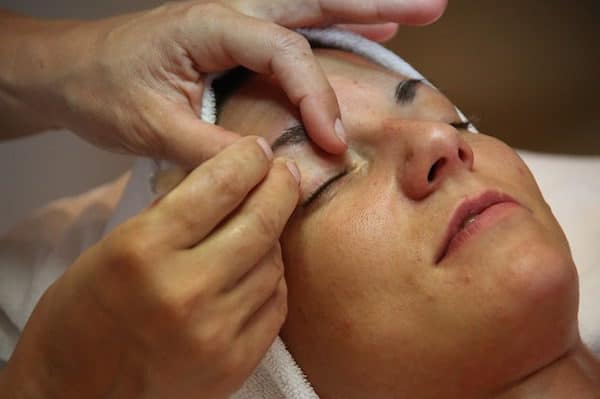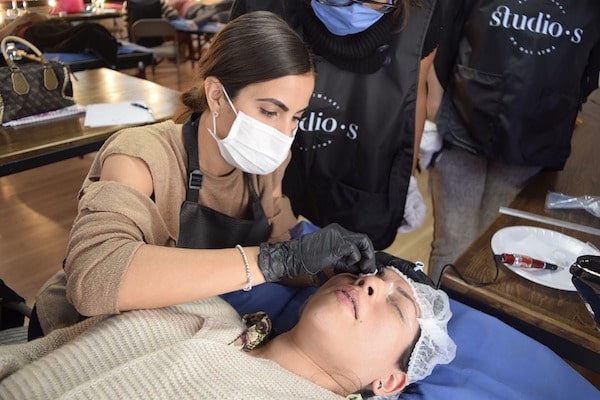Microblading is a hot, new beauty trend gaining popularity across the country.
The process involves using a needle or blade to create tiny cuts in and around the brow line. These areas are then filled in with pigment to add more definition and fullness to the eyebrows.
The procedure lasts a few minutes and is semi-permanent. It usually lasts about three years before more pigment needs to be added.
Essentially, microblading is a kind of tattoo treatment that provides fullness and definition. And, it’s a procedure that has gained extreme traction in New York City for its ease and lasting effects.
Microblading is so popular that people seek out the procedure any way they can — whether that means consulting a certified technician or looking to resources like Facebook and Craigslist to find a cheap substitute.
And, that’s where problems arise.

Because while microblading itself is a safe procedure with limited complications and health risks, it’s still a procedure that requires expertise and specialization.
Certified microblading have to go through dedicated training— over 100 hours plus additional coursework— in order to be qualified to perform this procedure.
And, this is a medical procedure — even if the risks and recovery are minimal.
Patients still need to make a consultation and then schedule an appointment just like they would with any other tattoo or medical treatment.
But, its relative ease and quickness started spreading, allowing more and more uncertified individuals to set up shop.
This includes the risk for a number of very risky illnesses — one of the most damaging being HIV.
What Is HIV?
One in seven people infected with HIV are unaware they have it.
HIV is a virus that leads to AIDS. It takes a major toll on the body, weakening the immune system and leaving your body open to other damaging illnesses, viruses and more. It’s a slow-moving virus that gets drastically more detrimental as the years continue.
Without treatment, those with HIV have a life expectancy of 9 to 11 years.
HIV Is normally a sexually transmitted infection. But, it can also spread through blood-to-blood contact. This means that it is also easily transmittable via exposed needles — like the needles used for microblading procedures.
There is no cure for HIV. There is treatment, however, that allows many of those infected to live relatively normal, healthy lives.
But, that doesn’t stop the damages done to the body and the increased risk it leaves behind.
During a normal microblading procedure, the risk of HIV is extremely minimal — as salons and centers are strictly monitored for cleanliness and proper tools. And, there’s also the fact that HIV can’t live very long when introduced to the air.
But, uncertified individuals aren’t held to the same standards as regulated salons. Therefore, it is very easy for them to skip on the essentials in order to ensure a quick and seamless service.
In these situations, your risk of contracting HIV is much higher.
It’s also important to note that the FDA does not regulate the pigments used. So, there is additional risk there in terms of infections and allergic reactions.

How Does Microblading Increase Your Risk Of Contracting HIV?
In normal circumstances, microblading is an easy and harmless procedure. But, when you add in the number of unlicensed microbladers into the mix, this procedure becomes more and more risky.
That means it’s extremely important to stay safe and make sure you’re working with certified professionals if you’re thinking about getting this procedure done.
In New York City, there are hundreds of licensed professionals offering these services. But, there are just as many unlicensed practices as well.
To protect yourself, do your research. Make sure the professionals you’re hiring have the right certifications. And, make sure you ask questions and alleviate any concerns you might have going into the procedure.
Many people choose to work with unverified microbladers because of the cost and ease. They don’t want to pay the hefty fees nor do they want to waste time with a consult, an appointment and then a follow-up.
Sometimes, people just have a friend that learned about microblading and want some people to practice on.
Whatever the reason, it can drastically increase your risk for HIV and other blood-borne illnesses like HIV that will do more harm than good in the long run.
Save the bargain-hunting for your post-brunch shopping trip. Your body will thank you.


